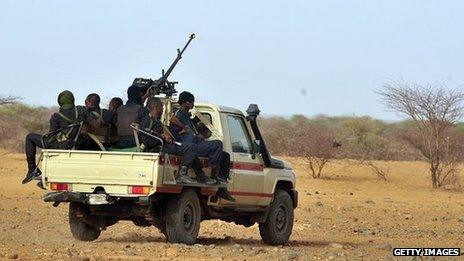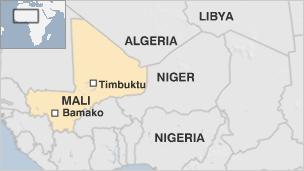Mali: Dangers of dealing with 'Afghanistan of West Africa'
- Published

Niger feels threatened by the the rebellion over its western border
Governments in West Africa fear both the separatist and the Islamist agendas of rebels in Mali.
The move to get UN backing for West African military intervention in the country reflects widespread concern in the region about the rebellion in the north of the country.
West African countries, through their regional body Ecowas, are seeking a mandate at the UN Security Council under Chapter 7 of the UN Charter - which allows the use of force.
A resolution was being prepared on Wednesday in New York.
'No Balkanisation'
But the potent mix of poverty, religion and ethnicity across the Sahel region makes even the threat of military action dangerous.
The UN estimates that about 18 million people are already affected by a drought and food crisis in nine countries.
And the unrest in northern Mali has caused the mass displacement of civilians.
President Mahamadou Issoufou of Niger put the official Ecowas position succinctly on his recent visit to London: "To the separatists, we say we need fewer borders in Africa and more integration - not Balkanisation.
"And to the Islamists we say we want a democratic, secular state - not Islamic dictatorship."
Since April, northern Mali - an area roughly the size of Spain - has been declared a breakaway state by ethnic Tuareg rebels. It has not been recognised by any country.

Islamist groups such as Ansar Dine, and others with reported links to the north African branch of al-Qaeda, have also established a presence.
President Issoufou went further, saying there were camps in northern Mali where Afghans and Pakistanis are training what he called terrorists.
And he said Islamists from the armed radical Boko Haram group, from Niger's southern neighbour Nigeria, were also there.
Some African diplomats now refer to northern Mali as the "Afghanistan of West Africa", in a reference to the situation there when it was under Taliban control.
"We are prepared to go to war," Mr Issoufou said, if negotiations fail to unseat the rebels and do not resolve the other side of what he called "Mali's double crisis" - the continued influence of soldiers who mounted a coup in the capital, Bamako, in March.
Porous borders
While West African countries are threatening military force, they will also be hoping UN backing gives a diplomatic push to a negotiated settlement.
Their aim is to restore Mali's territorial integrity - but northern Mali's pivotal position in an unstable Sahel and Maghreb environment makes any military action extremely dangerous.
The instability in Mali was prompted by the war in Libya when fighters used by the late Colonel Muammar Gaddafi fled south, via Algeria and Niger, after his death.
With Libya still under the influence of a variety of locally based warlords, the danger of any military action spreading across porous desert borders is very real.
The same applies to the southern flank of the Sahara.
If President Issoufou is correct, and Nigeria's Boko Haram has a significant presence in northern Mali, it could have major implications for Abuja.
If Nigeria contributes troops to any operation in Mali, as is likely since Nigeria is the giant of the region and bankrolls Ecowas, Boko Haram could hit back.
The dangers of military action are clear.
But the bottom line for most West African governments is that they cannot allow a breakaway state to survive because it could serve to encourage other potential separatist movements.